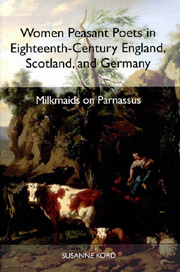Book contents
- Frontmatter
- Contents
- List of Illustrations
- Acknowledgments
- Introduction: Aesthetic Evasions and Social Consequences
- 1 Back to Nature: Bourgeois Aesthetic Theory and Lower-Class Poetic Practice
- 2 The Wild and the Civilized: Poet Making
- 3 The Life As the Work: Counterfeit Confessions, Bogus Biographies, Literary Lives
- 4 A Literature of Labor: Poetic Images of Country Life
- 5 Inspired by Nature, Inspired by Love: Two Poets on Poetic Inspiration
- 6 Of Patrons and Critics: Reading the Bourgeois Reader
- Conclusion: On the Gender and Class of Art
- Appendix: Short Biographies of Women Peasant Poets
- Works Cited
- Index
5 - Inspired by Nature, Inspired by Love: Two Poets on Poetic Inspiration
Published online by Cambridge University Press: 05 February 2013
- Frontmatter
- Contents
- List of Illustrations
- Acknowledgments
- Introduction: Aesthetic Evasions and Social Consequences
- 1 Back to Nature: Bourgeois Aesthetic Theory and Lower-Class Poetic Practice
- 2 The Wild and the Civilized: Poet Making
- 3 The Life As the Work: Counterfeit Confessions, Bogus Biographies, Literary Lives
- 4 A Literature of Labor: Poetic Images of Country Life
- 5 Inspired by Nature, Inspired by Love: Two Poets on Poetic Inspiration
- 6 Of Patrons and Critics: Reading the Bourgeois Reader
- Conclusion: On the Gender and Class of Art
- Appendix: Short Biographies of Women Peasant Poets
- Works Cited
- Index
Summary
Two ideas have predominated both the contemporary reception of peasant women's poetry and later scholarship: the assumption that the author's work must have been inspired by Nature (presumably because she was a peasant) and that the work must have been inspired by Love (presumably because she was a woman). The first idea is, as discussed in previous chapters, closely linked with conjectures voiced in aesthetic treatises about the nature poet and his or her predilections, themes, and genres; the second is a notion that is not particular to the work of women peasant poets but has demonstrably influenced the reception of bourgeois women writers as well. In this chapter, I try not to diminish the centrality of either concept for the writing of lower-class women: Anna Louisa Karsch, for example, was a prolific love poet, even though many of her most ardent love poems, which were inserted into letters to Gleim, were never published during her lifetime. Most peasant poets discussed in this book wrote some love poems, and Nature or nature imagery is undeniably central to their work. But whereas verse that uses love and nature as themes clearly constitutes a significant portion of these poets' oeuvre, my focus is not on these poems, which could be read as responding to bourgeois expectations, but rather on works that thematize these expectations more directly.
- Type
- Chapter
- Information
- Women Peasant Poets in Eighteenth-Century England, Scotland, and GermanyMilkmaids on Parnassus, pp. 194 - 215Publisher: Boydell & BrewerPrint publication year: 2003



